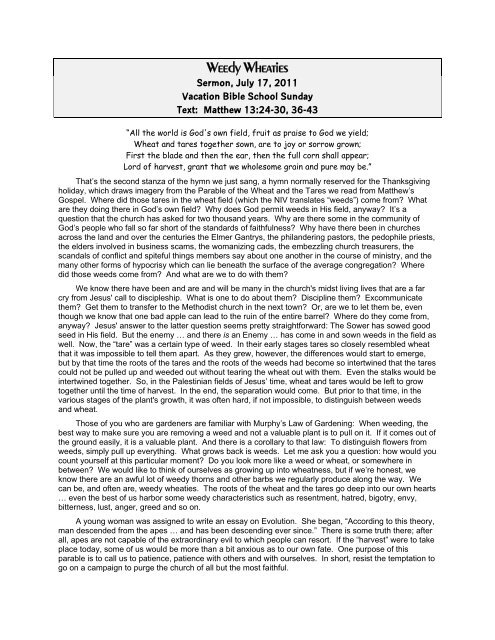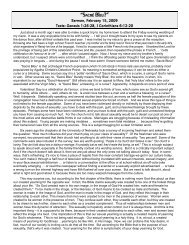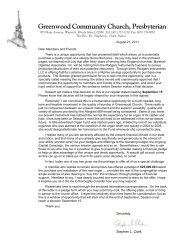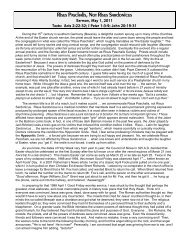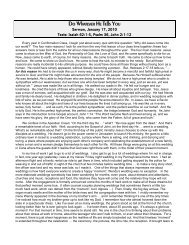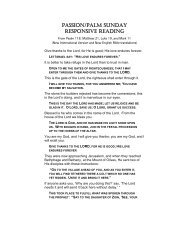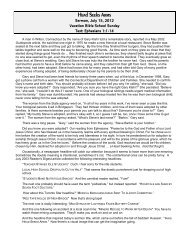Weedy Wheaties
Weedy Wheaties
Weedy Wheaties
- No tags were found...
You also want an ePaper? Increase the reach of your titles
YUMPU automatically turns print PDFs into web optimized ePapers that Google loves.
<strong>Weedy</strong> <strong>Wheaties</strong>Sermon, July 17, 2011Vacation Bible School SundayText: Matthew 13:24-30, 36-43“All the world is God's own field, fruit as praise to God we yield;Wheat and tares together sown, are to joy or sorrow grown;First the blade and then the ear, then the full corn shall appear;Lord of harvest, grant that we wholesome grain and pure may be.”That’s the second stanza of the hymn we just sang, a hymn normally reserved for the Thanksgivingholiday, which draws imagery from the Parable of the Wheat and the Tares we read from Matthew’sGospel. Where did those tares in the wheat field (which the NIV translates “weeds”) come from? Whatare they doing there in God’s own field? Why does God permit weeds in His field, anyway? It’s aquestion that the church has asked for two thousand years. Why are there some in the community ofGod’s people who fall so far short of the standards of faithfulness? Why have there been in churchesacross the land and over the centuries the Elmer Gantrys, the philandering pastors, the pedophile priests,the elders involved in business scams, the womanizing cads, the embezzling church treasurers, thescandals of conflict and spiteful things members say about one another in the course of ministry, and themany other forms of hypocrisy which can lie beneath the surface of the average congregation? Wheredid those weeds come from? And what are we to do with them?We know there have been and are and will be many in the church's midst living lives that are a farcry from Jesus' call to discipleship. What is one to do about them? Discipline them? Excommunicatethem? Get them to transfer to the Methodist church in the next town? Or, are we to let them be, eventhough we know that one bad apple can lead to the ruin of the entire barrel? Where do they come from,anyway? Jesus' answer to the latter question seems pretty straightforward: The Sower has sowed goodseed in His field. But the enemy … and there is an Enemy … has come in and sown weeds in the field aswell. Now, the “tare” was a certain type of weed. In their early stages tares so closely resembled wheatthat it was impossible to tell them apart. As they grew, however, the differences would start to emerge,but by that time the roots of the tares and the roots of the weeds had become so intertwined that the tarescould not be pulled up and weeded out without tearing the wheat out with them. Even the stalks would beintertwined together. So, in the Palestinian fields of Jesus’ time, wheat and tares would be left to growtogether until the time of harvest. In the end, the separation would come. But prior to that time, in thevarious stages of the plant's growth, it was often hard, if not impossible, to distinguish between weedsand wheat.Those of you who are gardeners are familiar with Murphy’s Law of Gardening: When weeding, thebest way to make sure you are removing a weed and not a valuable plant is to pull on it. If it comes out ofthe ground easily, it is a valuable plant. And there is a corollary to that law: To distinguish flowers fromweeds, simply pull up everything. What grows back is weeds. Let me ask you a question: how would youcount yourself at this particular moment? Do you look more like a weed or wheat, or somewhere inbetween? We would like to think of ourselves as growing up into wheatness, but if we’re honest, weknow there are an awful lot of weedy thorns and other barbs we regularly produce along the way. Wecan be, and often are, weedy wheaties. The roots of the wheat and the tares go deep into our own hearts… even the best of us harbor some weedy characteristics such as resentment, hatred, bigotry, envy,bitterness, lust, anger, greed and so on.A young woman was assigned to write an essay on Evolution. She began, “According to this theory,man descended from the apes … and has been descending ever since.” There is some truth there; afterall, apes are not capable of the extraordinary evil to which people can resort. If the “harvest” were to takeplace today, some of us would be more than a bit anxious as to our own fate. One purpose of thisparable is to call us to patience, patience with others and with ourselves. In short, resist the temptation togo on a campaign to purge the church of all but the most faithful.
Jesus intimates that if you were to go on a special campaign to clean up or clear God’s field, if wewere to embark on a special program to purge congregations and presbyteries and denominations of allthose who did not live up to gospel standards of outward conformity and behavior, you might very welluproot a great deal of good wheat right along with the weeds … and more often than not, the weeds arethe ones who will grow back, while the good people will move on. We tend to lose a lot of good peoplewhen we get preoccupied with weeding. When we go on heresy hunts, a lot of innocent people can havetheir faith injured or undermined or even uprooted in the process. Let it be … until the Harvest. Thatdoesn’t mean, though, that we don’t seek to uphold moral, ethical and spiritual standards … especially forthose who would seek to be officers and leaders of the church. The church is called to high ideals, moralstandards, ethical behavior, and there are situations where weedy behavior can so threaten damage thatdrastic measures are called for. But it is at the Harvest that the judgment will be enacted by the only Onewho is qualified to judge, and at that time the weeds will be suitably sorted from the wheat and destroyed.The fact is, we can’t always tell wheat from weeds. And it’s not really our job to do so. A goodillustration of this is our Old Testament reading. Jacob was a weedy wheatie. He may have went on tobecome a paragon of faithfulness as an Old Testament patriarch, but he had acquired a deservedreputation as a devious man. On the face of things, Jacob was a scoundrel, a cheat. He tricked Esau intoselling his birthright for a bowl of stew. Later, in collusion with his mother, he tricked his old, blind fatherIsaac into giving him the firstborn blessing, which belonged by rights to his brother Esau. Thebackground of our story today is that Esau has had enough of his brother's underhanded ways and hasdecided he was going to kill Jacob. This wasn’t just sibling rivalry, this was sible war! At his mother’surging, Jacob prepared to flee for his life to his uncle’s land of Haran, a distance of some five hundredmiles. He is running for his life! He is trying to put as much distance between himself and his vengefulbrother as possible. Jacob’s story is not about a holy man going to a holy place to meet God. It is abouta fugitive, scared of a brother’s deserved wrath, who is encountered by God while on the run.As the sun sets, Jacob comes to “a certain place.” Taking a large stone, Jacob makes a head restand lays down to sleep. But before the night is over he discovers that Someone greater than his brotherEsau is chasing him. He is being pursued by God. In this remarkable dream, Jacob sees the originalStairway to Heaven (with apologies to Led Zeppelin), and angels are ascending and descending this stairway,this escalator, this contact point between heaven and earth. At the top of the stairway was God, whospeaks to Jacob in the dream and promises, “… I am with you, Jacob, and I will watch over wherever you go, and … Iwill not leave you until I have done what I promised.” God promises to chase him and stay with him until thepromise first made to his grandfather Abraham comes to fulfillment through Jacob. Now think about thatfor a moment. God has chosen this self-absorbed, conniving, disreputable weedy cheat to be the bearerof the Promise, and God promised not to leave him alone until that promise has come to be. That is oftenthe way God works … it’s good news when God is after you! At times, it may seem like a threat,especially if you’ve been involved in weedy behavior that has you feeling like you are on the run. But Godis determined to do you good. You know how the story ends. God does continue to chase Jacob andcontinues to work on, in and through Jacob, wrestling with him until Jacob’s name is changed to Israeland he becomes the father of the twelve tribes of the people who to this day bear his new name.Now, what would have happened if the criteria of wheat or weed had been applied to Jacob as hewas dreaming at Bethel? With one voice, the jury would have shouted, "Pull him up by the roots; he is aworthless weed." But, God had other ideas, larger plans, and was willing to wait. And I am convincedGod is doing the very same thing with every person He brings through the doors of this church, youngand old. He is at work with you, He is at work with me, and I operate on the assumption that God willcontinue to work on you and me until He sees His work through to completion. We are all works inprogress. God is not done with any of us yet. And He has called us to tend to ourselves and the otherwheat in His field, and not to spend and dissipate all our time and energy trying to discern who is reallywheat and who is weed. The Lord has planted us in His field and promised to tend to us, to cultivate us,and the last thing He wants is for any of us to be prematurely uprooted, before He has finished Hiscultivating work of grace.“Lord of Harvest, grant that we wholesome grain and pure may be.” Amen.


